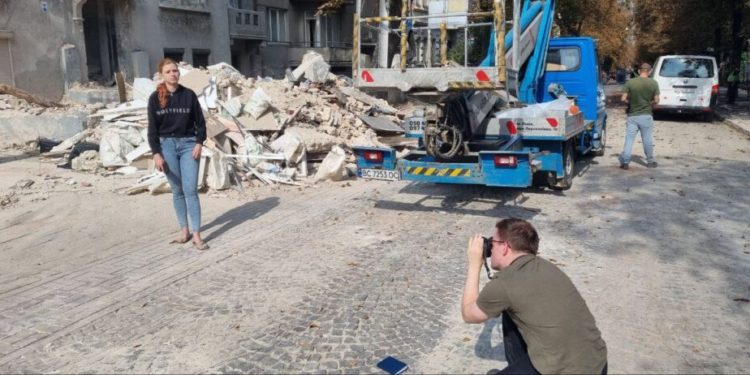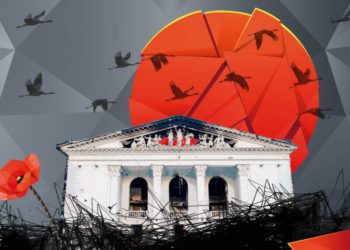Journalists of the world strive to highlight terrible crimes in the materials of their media. Many of them are helped by Ukrainian fixers. In particular, the American correspondent Samuel Lovett, who wrote a report for The Sunday Times newspaper from Great Britain, came to Lviv. In particular, he covered the events of the morning of Wednesday, September 4, when Lviv residents woke up to powerful explosions. This night seemed to be one of the most stressful since the start of the full-scale war. After dawn, hundreds of footage from the scene of the tragedy appeared online. Unfortunately, people were killed. Currently, it is known that as a result of the missile attack, seven Lviv residents were killed, and 60 people were injured. A total of 189 houses were damaged, and 52 families were left homeless.
In order to make quality material for the publication, the journalist asked for support from fixer Yurii and the Journalists’ Solidarity Center in Lviv. Center coordinator Nataliya Voitovych provided the journalist with the necessary contacts, and the fixer was able to adapt everything for Samuel Lovett. Comments for the material were provided by authorities, medics, and Lviv residents who were injured during the shelling.
The team visited Konovaltsia Street so that the reporter could see the destruction with his own eyes. Samuel Lovett to talk to the emergency services. They told more about how exactly the search operation for the victims took place and who was rescued.
“Near the destroyed house, we met a girl who lives opposite. Many interviews were conducted with various people, including eyewitnesses of the tragedy and victims. We also visited the St. Panteleimon hospital in Lviv, where the injured were brought. At the facility, they met a young doctor who had to stand in for a 36-hour shift because there were many injured people,” Yurii notes.
Separately, Samuel Lovett sought to tell more about the Bazylevych family, of which only the father survived, and three daughters and his wife were killed. The team visited the educational institution (Ukrainian Catholic University) where Daryna studied and talked with her friends. The correspondent of the British edition felt all the sadness and regret of the townspeople at the funerals of those who died as a result of the russian attack.
Today, it is extremely important that journalists document russia’s war crimes and cover the horrors because, despite this, the city is recovering and trying to return to life with indescribable pain.
Call the Western Ukrainian JSC Lviv-Chernivtsi at 097 907 9702 (Nataliya Voitovych, the Lviv JSC coordinator, Volodymyr Bober, an assistant). The Center’s address is 5 Solomiyi Krushelnytskoyi Street.
ABOUT JSC
The Journalists’ Solidarity Centers is an initiative of the NUJU implemented with the support of the International and European Federations of Journalists and UNESCO. The initiative is designated to help media representatives working in Ukraine during the war. The Centers operate in Kyiv, Lviv, Ivano-Frankivsk, Chernivtsi, Zaporizhzhia, and Dnipro and provide journalists with organizational, technical, legal, psychological, and other types of assistance.
ABOUT UNESCO
UNESCO is the United Nations Educational, Scientific, and Cultural Organization. It contributes to peace and security by promoting international cooperation in education, sciences, culture, communication, and information. UNESCO promotes knowledge sharing and the free flow of ideas to accelerate mutual understanding. It is the coordinator of the UN Action Plan on the Safety of Journalists and the Issue of Impunity, which aims to create a free and safe environment for journalists and media workers, thus strengthening peace, democracy, and sustainable development worldwide. UNESCO is working closely with its partner organizations in Ukraine to provide support to journalists on the ground.
The designations employed and the presentation of material throughout this digest do not imply the expression of any opinion whatsoever on the part of UNESCO concerning the legal status of any country, territory, city, or area or its authorities or concerning the delimitation of its frontiers or boundaries.
The authors are responsible for the choice and the presentation of the facts contained in this digest and for the opinions expressed therein, which are not necessarily those of UNESCO and do not commit to the organization.
Dariya Markova

 THE NATIONAL UNION OF
JOURNALISTS OF UKRAINE
THE NATIONAL UNION OF
JOURNALISTS OF UKRAINE
















Discussion about this post